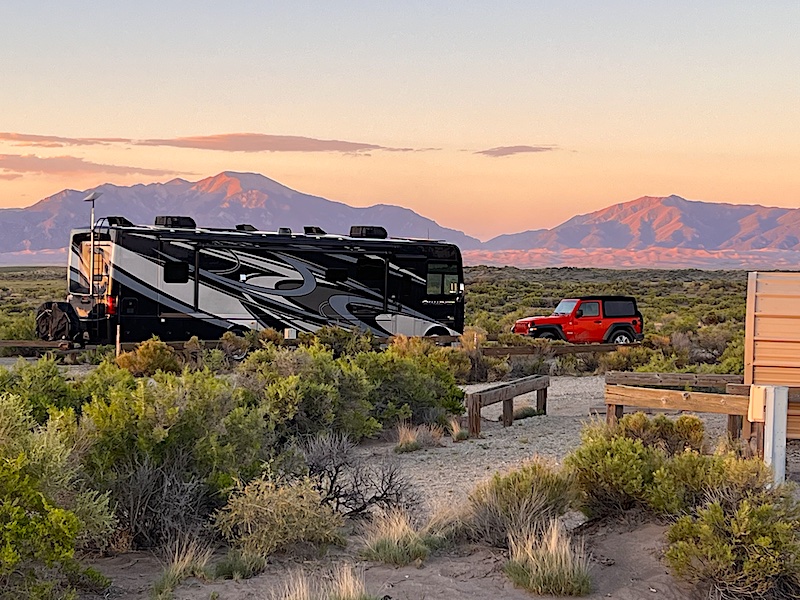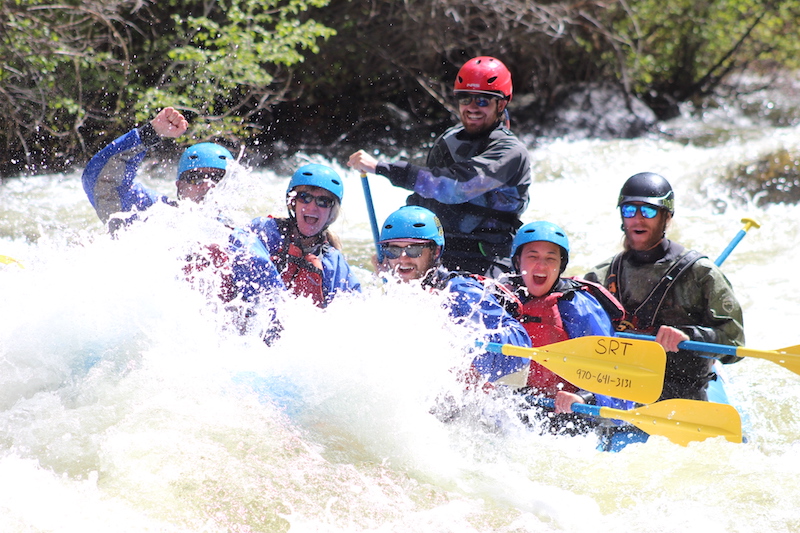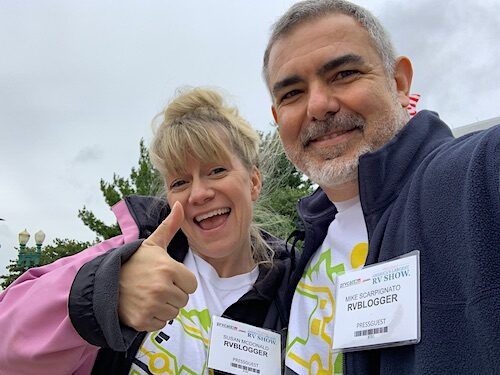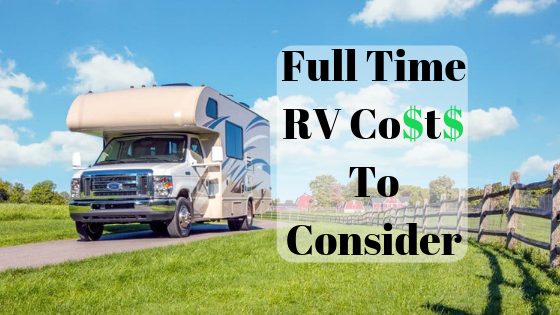Thanks for your support! If you make a purchase using our links in this article, we may make a commission. And, as an Amazon Associate, I earn from qualifying purchases. See the full disclosure here.
Updated April 8, 2024
Many imagine full-time RVing but wonder how to turn the dream into reality. In fact, the number one question people ask us is how much full-time RVing costs and how they can get started.
It’s all about having a plan. Now, some folks are great with that, while others just did not end up with the planning gene. Have no fear—it’s all outlined for you here.
Plan Your Income to Afford Full Time Living Expenses
Are you ready to retire, or do you have a job that allows you to work on the road? It costs money to live, no matter where you lay your head. And RVing isn’t cheap!
Workamping jobs, hosting campgrounds, writing, doing IT work, or working remotely while living from anywhere gives people the opportunity to keep their dreams going. Another plan may be to lease your home annually or allow adult relatives to live there at a reasonable price. This provides additional income for that RV lifestyle.
My main advice is this: Do not take the profits from the sale of your house to buy an RV. Why? Because your RV will only go down in value. Someday, when you are ready to stop RVing, you won’t have the money to buy a new house.
Susan and I are very fortunate to be able to maintain our sticks and bricks home while we RV around the country for about 9 months a year. We are known as 3/4-time RVers.
1. The RV Is Your Biggest Cost

Some folks are fortunate enough to be able to pay cash for their RV, so there is no monthly expense to account for. But for most folks, a monthly RV payment will be a monthly expenditure. The payment will then depend on the amount of the down payment and the price of the RV.
There are plenty of rate calculators for RV financing on the web to help you figure out your monthly payment. For example, if you borrow $70,000 and make a 10% down payment, your monthly payment will be about $700 a month with a 6% interest rate for 10 years.
2. Fuel Expense – Gasoline vs Diesel
RVs come in many shapes and sizes. If you choose a motorhome, we’ll assume you’ll be towing a car. A fifth wheel or travel trailer allows you to park it and use your tow vehicle for adventures and necessary trips to the store. In either case, fuel will be one of your biggest expenses.
We were on a merry-go-round, deciding between gasoline vs. diesel. There is no doubt that diesel motorhomes are better than gas. But they cost about $150,000 more. So the real question is: are diesel motorhomes $150,000 better than gas motorhomes?
We decided that they were not. So we purchased our Class A motorhome and added Liquid Springs to the suspension for $24,000, and now we have an awesome motorhome that drives like a diesel. We took our rig over the Rocky Mountains while towing our Jeep, and it did great!
Fuel costs are difficult to pinpoint. Fuel goes up, fuel goes down, and fuel varies from state to state. You can download apps to give you a heads-up on fuel prices in your vicinity. We’ve found www.gasbuddy.com does a great job.
In our case, fuel is not a huge cost factor because we stay for two to three weeks at each campground we visit.
RELATED READING: I also wrote an article called What is the Average Gas Mileage for a Class C RV? where you can find some great tips for improving your gas mileage and saving money no matter which type of rig you drive.
3. Vehicle Maintenance and Breakdowns
Tires are one of the most important things to maintain, period. If you want an RV lifestyle, you won’t be going anywhere without them. Do your research. Ensure your tires are 10-ply and have excellent reviews. Check your tires often. Properly inflated tires help avoid blowouts, provide better fuel mileage and last longer.
Naturally, you’ll have regularly scheduled maintenance for your RV and vehicle. Take the time to deal with whatever maintenance is needed on a motorhome, be it oil changes, brakes, hoses, batteries, tank cleaning etc. RV maintenance is very predictable and not that expensive.
Breakdowns happen from time to time. They are unpredictable and usually very expensive and time-consuming to deal with.
We purchased an RV warranty to ensure we don’t get surprised by large repair costs. The warranty cost us about $6,000, and we have already saved over $7,000 from breakdowns that have occurred in the two years we have owned our RV. This was money well spent in our opinion.
We had a three-slide break, our ABS system failed, and an awning topper broke. So far, we are $1,000 ahead! For more info about the warranty we purchased, check out our article, Protecting Your Travels with RV Warranties.
4. Insurance
RV Insurance
Vehicle insurance is a topic we all love to hate in many aspects of life. Of course, you are insuring your vehicle and RV. This might be the time to check around for separate RV insurance or your current insurer may be able to provide adequate coverage. It’s worth the phone calls to check pricing on coverage and a deductible you are comfortable with.
Roadside Assistance, in my opinion, is a must. We are aware that repairs will be needed. Whether you break down on the side of the road, have a tire blowout, or are stuck at a campground with a dead battery, a roadside assistance plan can help lessen the stress when that time comes.
Many insurance companies can add the plan to your existing insurance. Companies such as AAA, Good Sam or Coach-Net sell roadside assistance plans.
Full Time RV Health Insurance
Other insurance worth noting is your personal healthcare. Most employer healthcare plans will cover you no matter where you are in the U.S. Medicare plans vary, as do doctors who take Medicare. Depending on where you are, you’ll want to be assured you’re covered.
If self-employed while on the road, confirm that your healthcare plan allows access to doctors across state lines. Many full-timers also use Health Sharing through companies like Liberty Health Share. We are a couple in our late 50s who are in good health, and we pay about $450 per month or so through a health share.
We have had our insurance for 2 years, but I can’t recommend it yet because, luckily, we haven’t used it much. So we really don’t know how good the insurance is.
5. Campsites and Camping Memberships
Campsites and Campground memberships are by far our biggest expense. However, there are still plenty of ways to save.
Private Campgrounds: Most private campgrounds charge $40 to $80/night with full hookups. Some may include cable and internet. Depending on the time of year and popularity of the location, private campsites can cost upwards of $100/night.
Discount Camping Clubs: There are awesome discount clubs to help you save money on campsites and more! Escapees RV, Passport America, KOA Value Kard, and Good Sam are a few that offer campground discounts plus additional benefits to members. Their prices are reasonable, especially when considering the RV lifestyle.
RELATED READING: Check out our article called The 6 Best RV Campground Memberships where we share discount campground memberships like Passport America and also Memberships like Harvest Hosts and Boondockers welcome where you can overnight for free!
National Parks/State Parks: If you are 62+ years of age, take advantage of the Senior Access Pass for half-priced campsites. This lifetime pass costs $80 and can be purchased at any national park. Campsites will range from full hookups to dry camping. Many national parks do accommodate larger RVs. Discounted camping is also available to military personnel and veterans.
State parks generally charge less than private campgrounds; some provide senior or military discounts. Many have full hookups but, at a minimum, provide electricity and water with a dump station in the campground.
When choosing national or state parks, it affords you the opportunity to enjoy the natural beauty of the area, catch a glimpse of native wildlife or enjoy close-by paddle trips, hikes, and sights. A word to the wise, reserve your campsites early. Location and time of year will often affect availability if you, just by chance, pull in on a whim.
Free Camping: We’ve all heard of the Walmart parking lots or truck stops along your route. They can accommodate when you can’t drive another mile and need some shut-eye. We have an article full of useful info called Overnight RV Parking At Walmart – Know Before You Go.
Going this route will definitely save money, but don’t forget about BLM lands. Federal lands provide a multitude of campgrounds throughout the U.S. at little to no cost. BLM sites offer a variety of campsites, from full hookups to boondocking.
If you can boondock for a night or so, it’s freeing to get out of the campground routine and live in a spectacular environment. Check it out at https://www.blm.gov/.
6. Groceries, Dining Out and Happy Hours
At home or on the road, we all must nourish our bodies and souls. The costs associated with food, toiletries, cleaning supplies, dining out, and happy hours should be fairly consistent with when you were stationary in one place. But with inflation this has become a very large expense each month.
Many people enjoy checking out the local eateries or look forward to an evening out on the town. Farmers markets, local produce stands, and the town grocery store will provide you with whatever you love to keep on hand.
RVer friends enjoy their daily sightseeing adventures, then return to their home on wheels, set up for a happy hour and enjoy dinner at the campsite. Whatever you choose, these costs should mimic your accustomed pattern.
7. Sightseeing and Activities
You may have a special sightseeing tour in mind, depending on your travel itinerary. A number of national parks require a guide to view particular areas, such as Denali NP.
Other things to check off your list include whale watching, whitewater rafting, and a visit to Williamsburg, Virginia. With so many sights to see in the U.S. alone, our bucket lists can keep us busy for years.
Be sure to research any discounts that might apply on tickets, such as senior discounts, AAA, weekday vs. weekend, etc. If your kids are wondering what you might want for your birthday, give them a few ideas.

8. Internet on the Road
While we love life on the road, we also need a connection to family and friends, and life goes on. Every RVer I know requires a decent cell provider so they can access directions, make reservations, google places in an area, and stay connected. If you do not have unlimited cell data, the added price to do so may be worth its weight in gold.
Campgrounds often offer an internet connection with the campsite. Businesses, such as Starbucks or Panera, offer free on-site connections. Some locations may find you with a stubbornly slow internet connection.
Cell providers offer Wi-Fi capabilities called hotspots, which can be accessed via your cell phone. Depending on the data plan and provider, a hotspot can run $20-$75/month.
When it comes to watching TV in your RV, it’s rather optional. Some campers are fine with whatever their antenna picks up. Private campgrounds occasionally offer cable.
Otherwise, you basically have two choices – DISH TV or Direct TV. Packages range from a basic $30/month to as high as $90/month for 250+ channels with high-def services.
We use a combination of T-Mobile Home, Starlink and Verizon Mobile. Check out our video below to see how we always have internet. We need it every day because we work on the road!
9. Miscellaneous Expenses
Ah, those lovely little add-ons each month that life brings our way. We know it’s always something. Additional expenses might include new clothing, a birthday gift that must be mailed along the way, a computer mishap that requires replacement, propane, lots of coins for laundry or mail forwarding services you may require.
Let’s not forget you will encounter tolls on the road. We have a Sun Pass that works in several states, but certainly not all of them. Just verify when you’ll need to pull into the pay lane and chalk up the change.
When traveling with pets, the fur babies will still need their annual shots, flea and tick treatment, and possible grooming and might encounter a visit to a vet on their travels.
RELATED READING: Check out our article called Cheap Retirement – Living in an RV to see if living in an RV after retirement is right for you!
Our Full Time RV Monthly Budget
| RV Expenses | Annual | Monthly |
| Insurance | ||
| Mike Health | 3060.00 | 255 |
| Susan Health | 2700.00 | 225 |
| Wrangler, Prius, Tacoma | 2959.52 | 247 |
| Umbrella Policy | 382.65 | 32 |
| Dental/Vision Insurance | 1260.00 | 105 |
| RV Costs | ||
| Tolls | 600.00 | 50 |
| Propane | 100.00 | 8 |
| Maintenance | 1000.00 | 83 |
| Gear/Supplies | 1200.00 | 100 |
| Registration Renewals | 270.00 | 23 |
| Storage | 1000.00 | 83 |
| Class A and C RV Ins | 2229.00 | 186 |
| Class A Pymt | 11340.00 | 945 |
| RV Fuel | 2000.00 | 167 |
| Campgrounds | ||
| Memberships | 1300.00 | 108 |
| Campgrounds | 4000.00 | 333 |
| Personal | ||
| Groceries-Cleaning-Etc | 9600.00 | 800 |
| Dining Out | 7000.00 | 583 |
| Jeep + Tacoma Fuel | 1800.00 | 150 |
| Car Maintenance | 500.00 | 42 |
| Clothing | 600.00 | 50 |
| Hair Styling | 800.00 | 67 |
| Gifts | 1200.00 | 100 |
| MD 529 | 1800.00 | 150 |
| Gym | 600.00 | 50 |
| Tolls | 300.00 | 25 |
| Cell Phone/Internet | ||
| Cell Phones | 3000.00 | 250 |
| HULU | 840.00 | 70 |
| T-Mobile Home | 600.00 | 50 |
| Starlink (only needed 4 months) | 600.00 | 50 |
| Verizon Winegard Chip | 240.00 | 20 |
| Miscellaneous | ||
| Misc | 3000.00 | 250 |
| TOTAL | $ 67,881 | $ 5,657 |
Final Thoughts about Full Time RV Living Costs
Life is good. Taking the plunge to full-time RVing can be a dream come true with a little preparation, budgeting and a leap of faith.
Take some time to make an Excel spreadsheet or search online for an RV budget worksheet to guarantee you know about the expenses you may incur. It’s a good idea to set aside an emergency fund for that unexpected repair, added fuel when prices spike, or the luxury of bucket list items you don’t want to miss.
May your spirit soar and your adventures never end.
Do you have any comments you would like to share about full-time RV costs? Please share your thoughts in the comments section below.
Thanks for reading this article and if you would like to email us directly, please visit our Contact Page to send an email.
Learn More:
– 19 Best Work Camping Jobs for Retired RVers
– Cheap Retirement – Living in an RV
– 15 Reasons You Will Regret an RV in Retirement
– How Much Does Van Life Cost Per Month?
To see a list of all of our articles check out the Blog Archive!
Mike Scarpignato – Bio
Mike Scarpignato created RVBlogger.com over five years ago in 2018 to share all we have learned about RV camping.
Mike is an avid outdoorsman with decades of experience tent camping and traveling in his 2008 Gulf Stream Conquest Class C RV and 2021 Thor Challenger Class A motorhome.
We attend RV Shows and visit RV dealerships all across the country to tour and review drivable motorhomes and towable trailers to provide the best evaluations of these RVs in our blog articles and YouTube videos.
We are 3/4-time RVers who created RVBlogger.com to provide helpful information about all kinds of RVs and related products, gear, camping memberships, tips, hacks and advice.




Awesome info! We have a sun pass too…but have just gotten it. Love all the other info!
Thanks for all your great ideas and useful information. I’m considering going full time with RV living in 2022. I need all the help I can get.
Thank you for information and knowledge.